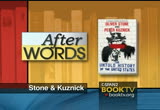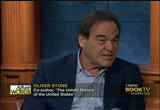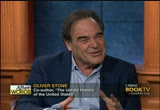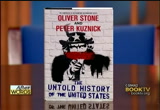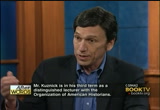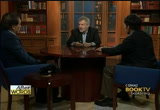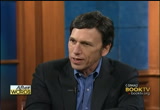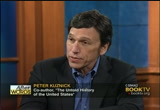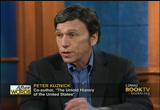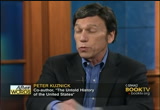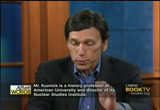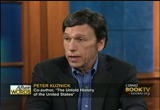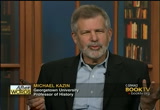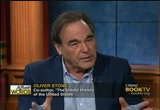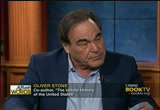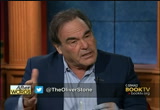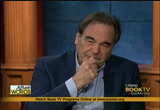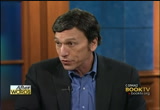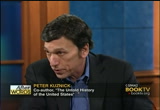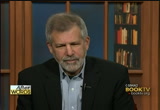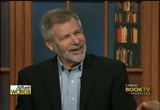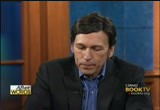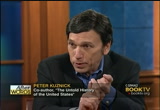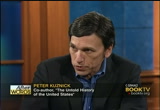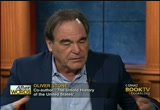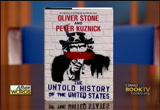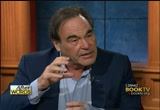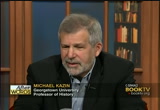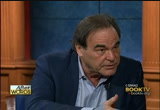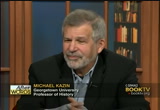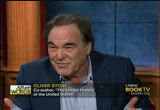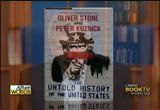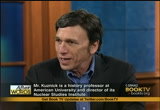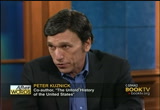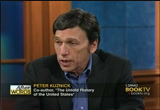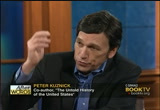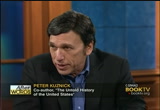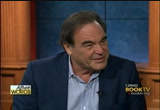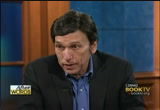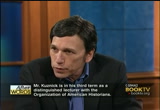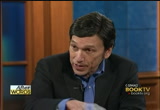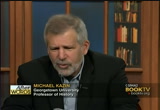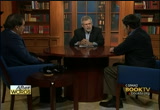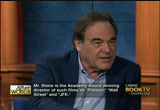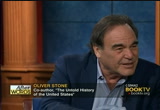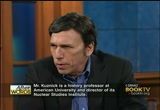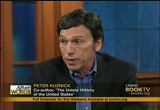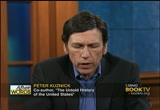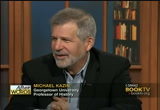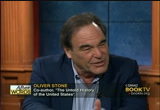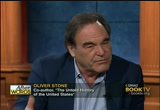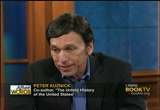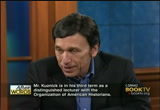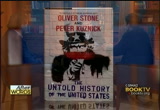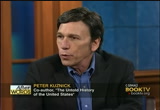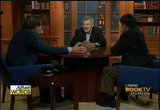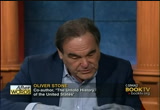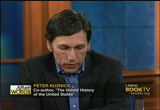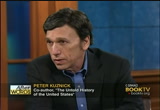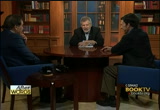tv Book TV After Words CSPAN December 30, 2012 9:00pm-10:00pm EST
9:00 pm
9:01 pm
bomb and it always fascinated me because i was born the year after it dropped, and a controlled and my father was republican and conservative and served in world war ii with eisenhower. so obama everything we did was in the shadow. i was curious about it. he said the story does have another origin and he went into the 1930's and he's written a book about the scientists but above all he mentioned a figure in 1944 he was bumped by the political bosses. and that led of course to the 45 decision by truman so now we begin the origin of the current idea for the documentary or movie and he wrote the script, it didn't work for me, but that
9:02 pm
story the other day he is still teaching the class and we decided to go ahead and do a documentary. not one hour turned into a bigger, our arms were bigger than our stomachs and i think we tried for 12 hours national security state story from 1940's to now in the expansionary war and ended up in 2012 but we started in the series now the book we decided this is getting very serious and we know i'm going to be called on this because of my background and this is part fiction and part fantasy. they were feeding all the time and choking each other constantly.
9:03 pm
>> from 1996 and we decided we were going to go ahead and did this project and i thought we could do at in the 60 minute documentary and. what i thought was going to take place in the of taking four and a half years. but it's important to add the book because i was surprised how little information you can convey in a 60 minute documentary episode. so the book was an 800 page book that cut out pages to get it down to 800 pages because they also wanted to give the notes and the sources and much more detail in this because we know we are going to be challenged in offering a perspective that is not an administrative
9:04 pm
perspective and we want to have our resources out there when we get challenged. >> and it is addressed to people like my daughters and my sons in the high school level history so let you could read this book and see this documentary. it's tough, but you could understand the college level and you start to specialize and much of this is available to students and my daughter's history books even today when you get for the example into hiroshima there was no mention of an alternative possibility. they serve american lives because it is about the fanatics, you don't hear but the russian side of the equation and the other traces that could be had. >> it stirs up controversy and i wonder if we could move on to some of the areas that they
9:05 pm
argue have already elicited the commentary on different sides. the cold war is essential to when you write about here and to the film, and perhaps as i read it your argument mentions that the united states is primarily to blame, that stalin and the soviets would have been open to a new welcoming continuation of the wartime alliance between the two countries, but it was the american actions primarily. some allies, the british for example, which leader of a wanted gold for. is that an adequate portrayal? >> guest: i would say that's accurate. we certainly don't consider the stalin to be blameless in all of this and we certainly don't downplay the brutality or the terrible things that were done in the name of the soviet union
9:06 pm
under the leadership. i think it's important to factor in, but look at the broad sweep of the history of the relationship with the soviet union beginning in 1917 and 1918 when the first sent the troops into the soviet union as part of a broad counterrevolutionary force led by the british and then the united states refusal to recognize the soviet union until 1933 under roosevelt, and then during the 30's the soviet union was pushing very hard for international consensus and trying to stop hitler and they were leading the antifascist force globally coming and the calculus party was instrumental and they had to have a movement in the united states from that. but during the war after germany attacks the soviet union in 1941 the united states and the british decided they are going to support the soviet union because it is the key to the chance of surviving the war during the soviets and to keep the soviets in the war. they were caught so off guard
9:07 pm
that they were concerned and the soviets are going to capitulate that but they offer several things and the soviets make several demands and promised the material and have a hard time delivering that in the first couple years but stalin says if you give the airplanes and the other equipment we need we can stay in a war. so that is the sincere effort other people are not quite as sincere and providing that. so the second demand, what they want with the concession that they had gotten from hitler in the 1939 pact, and their main demand was for the second. they were fighting. this is the history of this period the americans and the british troops out most of the work were fighting the not provisions combined and there were fighting to hundred, so they were desperate for the united states to open a second front in western europe and the
9:08 pm
british, and roosevelt asked stotland to send the top general to washington in nabf 42 and in june of 40 to the issue a public statement saying we are going to open up the second front before the end of the war before the end of the year in 1942. we promised that publicly. and yet the open up in june of 44. that's partly because the british refused to go along with this and that the british get involved in the periphery in northern africa. they are serious but they didn't open up the second front with the united states brought instead basically to defend the provision higher. >> how does this link to the cold war? >> there's been to the mistrust between the soviets beginning during the war treatise of the seeds of the cold war are visible during the war. there are certain tensions of
9:09 pm
course because the fact that they delayed the second front know that the soviets had on their own largely defeated the germans after stalin and rather what pushing it across central europe and eastern europe moving towards berlin and they lost the mission and there's also a diplomatic initiative at that point and so the surgeon deal is being made between churchill and stalin in october of 44 dividing three the british would get 90% and the russians would get 90% of bulgaria and hungary and they've added it up that way and it was pretty cynical. so, but when roosevelt died in april of 45, the last telegram to churchill is we always have these minor disagreements but we end up resulting them and so let's not make a big deal the there is no reason we cannot maintain threats until after the war.
9:10 pm
when truman gets in in 1945, he immediately takes a different course. roosevelt's alliance with the soviets was still strong at that point but he turns to the advisers roosevelt never trusted in the first place. they met the second day from south carolina and the private plane and they give the same methods so they are breaking their agreements and they cannot be trusted. they've broken the overall agreement, so the u.s. policy towards the soviet union is going to change in april of 1945. by the time there's a big meeting on april 23rd on april april 23rd the united states had changed course so at that meeting first teammates with his
9:11 pm
advisers one-fifth within marshall, leahy telling him they are grateful to the soviets and since the secretary of war understood the soviets have a much better understanding to their own security especially around poland than we do. >> stepping back from those details, do you think that it was realistic for these two powerful nations, continental powers, each to ochre and had i think was fair to say the entire one for all because the soviets obviously have their own different smaller states under the control and fifth. whether the two powers were in there is the logical bases to get along for very long.
9:12 pm
of course it never would have happened, but arguably stabenow as you know himself who is the head of the communist party told the communists and 45 get ready for the class war to continue in effect. don't believe the peaceful coexistence is going to last. and at the same time as roosevelt is dying actually. >> i would like to -- not as a historian, but as a person came to look at this in a different aspect than i ever did as a young person when i was the victory at sea. they have nothing compared to the provision higher in the coming power saws russia because they grow during the war and the soviet union, don't forget the
9:13 pm
arm themselves across the mountains and we make themselves. it's an extraordinary story. migration and reconstruction and dedication of the people and of the losses of the soviets with this 22 or 27 million the stalin's it doesn't matter they plunged into this thing and it was a crucible for them at the war. but the british churchill has a fascinating overlay on this because he has a different motive it seems. once the british islands are saved in the battle of britain his goal seems to be truly to regain the empire. he said i do not mean to dismember the british empire. and the whole -- the whole concept of going to north africa, sending troops into the southern belly of the nazi empire, italy and the balkans, regaining greece which is a tremendous story. everyone talks about eastern europe. as an outsider i see what about the british when they went back
9:14 pm
into greece in 1944 and started bombing the streets of athens and killing the people, the communist resistors that fought against the nazis. the british were ruthless. that is another point. people say look at what stalin did in poland. he broke the altar. i don't believe they did. i will tell you more about that. look what the british did. but we did increase in the cold war period, the early cold war period we and the truman doctrine of 47 to 49, we had american advisers and early vietnam there were already over increase read the the british coal is truly to get back the mediterranean, along the region's coming get iran back in the conflict in iran in 1945. beyond that, it's crucial. we showed that in the beautiful maps. he gets to the far east and it
9:15 pm
is the richest resources around known to britain, not us. so then it isn't -- you can't dhaka the u.s. soviet relations without talking about the british empire. >> here are the three parts of the cold war in the beginning. most americans have no idea. and they have no idea what role the british are playing but roosevelt did, and roosevelt was very, very critical of the british empire has was his vice president from 41 to 45, henry wallace. they want to bring it to the could dismantle the british empire, the french empire, the portuguese, they were very anticolonial. they encourage them and give them a did. it gets us involved in vietnam and in a lot of turmoil that we are going to leave her face. but the other questions you were raising we don't know if there
9:16 pm
would have been a clash between the americans and the soviets. we had a different interests but we had a very good alliance, and april 23rd, the crucial meeting they both make the point and now we have the soviets and the good wartime allies they also delivered more than the had promised. and so the but were confident that there could be postwar friendship. eisenhower was sure at the point that there would be post war friends and he didn't think it was about that until august 6, 1945 when he got the word of the atomic bombing. so eisenhower felt strongly. and roosevelt have felt strongly along those lines that's why she's focusing on the two weeks how rapidly things change in the first two weeks when truman takes over and truman comes in and he is laid over his head which he admits. he has recurring nightmares as vice president that they not on the door in the middle of the night, the secret service would come and see the president is
9:17 pm
dead, your president now. that was his nightmare for good reason. he was not prepared. he wasn't chosen because he was qualified to run a. when they chose him in 44 to run for the senate, prendergast was asked by the newspapers' white teaches him to run for the senate? and prendergast says i want to serve the world as a well oiled machine to take an office boy and get him elected to the senate. truman in his first term is considered the senator from prendergast shunned by the other senators. even in the second term he develops more of a national reputation but he's not an expert on any of these kind of issues. so he gets in there and from the beginning every meeting he has with people he says this is a terrible mistake. i'm not big enough, i am not smart enough. he goes on april 14th, 1st day in office and meets with reporters at the capitol, and they -- she says if you pray, pray for me now. i don't know if you've ever had this fall on you but the moves
9:18 pm
and the stars and all the other planets have fallen and one of them said good luck mr. president and he said i wish you didn't have to call me that. some of the unsung hero of your book and i know looking at the screen play awhile back about wallace, you know, this is one of the great contractor was of course of the modern american history. but if he had gotten nominated in 1944. and we are doing the but i know that it's from florida and was about to nominate him and you argue that the convention would have gone along with that. he was much more popular than certainly the other people there. i do want to pressure a little on that because on the best biography of wallace and the
9:19 pm
former senator from iowa and they make it pretty clear based on the evidence that the fbi didn't wallace to run that. he did say nice things while he was an office but then that very evening he meets with people that are very dead set against him, people from misery and otherwise and the only talk of the truman or douglas. >> we've been through every piece of that information.
9:20 pm
>> that is a valid perspective. there was no chance he was going to survive, and they were going to try to get wallace off the ticket. it was run by two people, the national chair that france and laws machine that got true many elected in 1940 and ended pauli was a california millionaire that said i went into politics and realized it was cheap to elect a new congress than to buy at the old way and he is going to get indicted for treason. >> so, they decide they're going to try to resolve delete user count him to convince him that he can't get free elective wallace is on the tickets.
9:21 pm
we are not denying that. in 1941 when henry made his famous speech saying the 20th century is to be the american sentry and the united states is and to dominate the world economically and politically and militarily and culturally. he responded to that as vice president and me the speech. they had the people's revolution in the tradition of the french, the american, the latin american and russian revolution he called for ending colonialism and imperialism and the economic exploitation spreading the fruit of science and technology are not of the world and the southern segregationist was the leading spokesperson, the antifeminist because he was the leader in the human rights of the party and the entire imperialists and the conservatives that said america's fascists are acting king wall street comes first and the american people second so we
9:22 pm
had enemies and they wanted to get rid of him on that ticket in 1944 but the problem was he was enormously popular. 65% they want wallace on the ticket and 2% said they wanted. truman that the question is how were they going to thwart this. roosevelt when the party busses started to come to him and they want to get the rottweilers of the tickets, roosevelt says to him i support him but i can't fight this campaign myself. i'm not strong enough. i'm depending on you guys to do it and he finally caved in and it was terrible that he did. his family was furious. every single one of them were furious. there were huge wallace supporters and he had the backing of labor and the black delegates at the convention and there was a fight between the conservatives in the party when
9:23 pm
they split in the democratic party's with a segregationists in their like they used to but it's that kind of fight. so they didn't have the gumption to fight at that point and the strength but they said to wallace it is a convention set by the delegate which he would have, but it's tragic as we say in the documentary this tragic to have the strength to fight at that point. >> i sensed in the opening question that you're pointing to the forces of history. and i see the marxists side that push history. >> wallace would have been opposed and the forces were not in the favor and they were ultimately between the capitol some forces communist ideology.
9:24 pm
>> they were misinterpreted by the west about the two systems which actually that speeches made by the hawks. >> they were becoming hostile to the soviet and that is to step up during the cold war and we go there because we go into those months by months from july 45 to march 46 when churchill gives this incredible speech. but as a benign coming from the outside, you've studied this all your life. i'm fascinated by the 30's and we did a chapter on the 30's and also the philippine, the woodrow wilson period, and what happens is the concept of communism comes and goes and has many phases in america but it's leiber and ties to the ideas that some of the ideals of
9:25 pm
socialism and we see it in the movement of the 1870's and we see the relationship to the french collectives of the 1870's and the 1830's. there are the working man's rights, the farm movement, the progressive movement. she kind of puts a stop on that. he comes down and goes to jail and all these people disappear and are thrown out of the country because of was world war i. so, these are the forces that are moving america. there is movement towards this place we are going to. i am curious to know what you think those forces are. where the labor movement is going to end up because they argue there are moments in history, tiffin plants things can change where there can be of wallace, they can make that convention moment. >> it could turn, and it could turn again and maybe had turned in the past view estimate it
9:26 pm
came so close. cemetery guess what he is thinking of because that is the question. >> well, you know, there is a difference between someone like that and goldman and communists who have power. a goldman goes to the soviet union and russia both in 20, 21, but goes with great hopes in the world you argue this quite rightly even if it is the system that does industrialize the country at a tremendous cost, so i can and not as an anti-communist that thinks that stalin was horrible mass murder, one of the worst of history, and yet at the same time, i agree
9:27 pm
with both of you that the united states is hardly blameless and did a lot to exacerbate that rivalry, so we will take a break in just a second but when we return, i would like to sort of refer to kennedy and talk about the dramatic turning point in the crisis. >> would you say that the american capitalists most were very concerned about the movement? >> the 1930's is a frightening moment and in striking world war ii than any other time in our history. >> it was a tremendous dissatisfaction right after the war in the 45 and 46 period.
9:28 pm
there are dislocations in american life and isn't it more convenient for the bosses and the owners operating and the eletes to look to reflect the american life by pointing to stalin and the communists and saying -- this is the enemy? >> of course it was delayed quickly after the progressive party debacle because the cold war. at the same time, lincoln saved the right at the corporate interests used that year fear to turn people against. at the same time with the soviets were doing in eastern europe is independent state for
9:29 pm
democracy -- >> where is the energy, the energy is in the united states. stop the strikes, stop labor. i think stalin has always been a convenient destruction for the right and the center, the true man up to today. >> the fact that economists were doing what we're doing also made it easier. >> that's what concerns me when you see all the liberals such speaker and also the true and liberals that will drift in this direction and it changes american history terribly because right now we have no union movement. i think the concept of sleeper versus capital isn't even discussed in this country. >> this is what happened and this is far more important frankly than pointing the finger
9:30 pm
9:31 pm
clearly one of the most dramatic events of the presidency was the missile crisis in october, 62 which all of us lived through as teenagers. toggled if you what about how you think that crisis came to be and why it didn't yield and a nuclear holocaust. >> well, khrushchev actually made a big blunder in the cuban missile crisis and that was not just putting them vessels with the nuclear warheads into cuba. it was not announcing that they had done so. he undermined his own deterrence. what he was trying to detour was the u.s. invasion of cuba. the united states had been planning an invasion. as a matter of fact we had an event, a mock invasion planned
9:32 pm
for october 62. >> the second invasion after the bay of pigs -- >> after the bay of pigs, right. and it was castro spelled backwards. the heavy planning for an invasion to overthrow of the disaster of the bay of pigs and we had the operation running on booze which was the counter insurgency terrorist program. so it was clear the u.s. was planning an invasion. khrushchev thought he could kill two birds with one stone by changing the balance. the united states was so far ahead in the missiles and the ability to deliver warheads and he thought if we could put the missiles in cuba that would somewhat offset america's biggest feige in the nuclear weaponry in 1962. and they could deter the u.s. invasion of cuba. the mistake that he made was in announcing the weapons were there and that he also had a hundred a battlefield nuclear weapons or their and the united states doesn't find out until
9:33 pm
1992 he almost passed out when he found out about that. so, -- >> did with the missiles in cuba and the united states has covered that and then the tension builds and we have the one of the things that happens during that time is that the soviet submarine this felled by american ships and start to drop missile charges, debt charges on the soviet submarine. they knocked out the electrical system. people are passing out inside of the submarine. the had no communications with of adrenalin. the submarine says load the torpedoes. let's attack. the world war probably started already and they are doing somersaults down here when the war is starting. we are not going to disgrace the
9:34 pm
country. the launch a nuclear torpedo and they said it ready to launch. fortunately one of the other commanders on the ship that had a lower rank talked him out of it. stat what was his name? >> he might have saved the world become a known soviet commander. he talked them out of launching the nuclear torpedoes. had they launched the nuclear torpedoes, world war iii would have started right there. even after that, we came very close to planning the invasion. it's amazing how little we knew about what we were going to find. we had 33 of the 42 that were located. we couldn't see the other ones. we had no idea what the nuclear warheads were. we never discovered them. our plan was to invade and also to bomb the soviet facilities. we later found out the soviets
9:35 pm
had 10,000 troops and there were 100,000 armed cubans. we later found out that the soviets had 43,000 troops, and there were two under 70,000 armed cubans, said the initial plan is that we iffen been dated we took the casualties, four to 500 dead. after they found out how many troops there actually were, he said that would have been 25,000 dead. then he found out they also had 100 battlefield nuclear weapons they would be using on the american forces and he said 100,000 americans would have been killed. it would have to absolutely destroyed cuba and very likely taking out the soviet union also. so we came that close. fortunately, kennedy and khrushchev were both doing everything they could to try to prevent the nuclear war. and they finally succeeded but came close to them not succeeding. kennedy said the chances were one out of two that we would have had a nuclear war and khrushchev thought they were closer than that and he felt the american invasion had begun. >> it sounds like it was in many
9:36 pm
ways enactment of -- >> she had no way to know how close he was to the truth of what was happening. >> do you agree with the story that this was a key turning point in the cold war? >> yeah. >> that kennedy was -- >> they mentioned that in the 1950's apparently to this period is the brank center on the part of dulles and eisenhower using the nuclear threat. so there's a background here. but this is so close to the edge. it really was one of the scariest moments. schlesinger said this. we didn't know. we were teenagers. but that is when all of this criticism with kennedy and all of this quarter backing. but my god, we wouldn't even be here to talk the --
9:37 pm
>> afterwards they said we were defeated. >> that was a mistake. >> and they ran the bombing against the japanese in world war ii three we ran the story about the bombing in a bottle or two but before -- >> let's solve this. let's not have things get out of control. >> may be good can come from this evil and eliminate every crisis point that can lead to a conflict and kennedy was slow to respond. >> he gets overthrown. >> he backed out of the cuban missile crisis and just like people never forget kennedy for backing down of the crisis they were furious. let's go and invade now.
9:38 pm
but he reaches out and kennedy response slowly. but first we realize they go over there and he says he's really serious. >> because he is the editor. >> that requirement has the same thing. and he responds in a number of places. he had already neutralized the solution that made people angry and the joint chiefs but now he says let's enter the space race. the was the signature initiatives she says why should we compete going to the moon? let's do it together, let's collaborate. and we believe that he gets to run into cases he wants to pull out of vietnam. and the american university speech which i think is the most visionary by the american president in the century they basically call -- >> he has a few and a couple
9:39 pm
others that are wonderful this is a great speech in 63 they basically say let's end the cold war and he's reaching out so she's responding to read both of them are reaching out to each other. the test ban treaty, the limited test ban treaty which is a major milestone. a major victory. of a series of things that are taking place during that time. kennedy also learned some other lessons as we talk about. one of them after the bay of pigs was don't trust the cia or the joint chiefs. the joint chiefs mesons of bitches and when to scatter them into a million pieces in the wind. >> he puts the cia operatives under the ambassadors in the various countries and they were furious about that also. so the visa and other things. the change in mind after the
9:40 pm
cuban missile crisis we see a new kennedy that is left, a visionary kennedy, kennedy that wanted to end the war. it's a tragedy. >> yes. well you call little less airport i call that -- >> this is the third commercial in baltimore. >> now, obviously one of the last things that happens when he is alive that has a very poor impact on the foreign policy is the assassination of the president of south viet nam from our client, our ally over there. then two weeks later, three weeks later, kennedy himself is assassinated. and as you said before, this begs the question that historians argue about. we will probably keep arguing about that the next 50 years.
9:41 pm
what kennedy has mounted to -- what he have pulled out of the american troops in vietnam and the advisers if we didn't yet have the troops and the great numbers of the combat troops there? and you are doing think that indications are that he would have come in and you cite various sources about that. curious just to challenge that a little bit. there is a wonderful book by a story called choosing war which you probably know. in which he says that the viet cong attacks were doubling in november from the month before and south vietnam and that there were meetings of kennedy's tauter advisers which i think finished up the day before kennedy was assassinated. this would be a good film. and incidentally the viet cong we are going to win if they
9:42 pm
didn't do something very quickly. so, not to challenge the members of people who were devolve in the sand kennedy would have pulled out, but wouldn't it have presented kennedy if he had lived with the very difficult choice that is losing to the army in effect the guerrilla force which was obviously backed by the soviet union. >> i think we make the argument that kennedy had been under pressure from the joint chiefs in an enormous weight in the cuban missile crisis in devotee of pigs. so he was the one who could stand up to them. that meeting by the way was mentioned years ago by frederick it was a very strange thing and most of the cabinet paper out of the country when the president was killed in dallas and it
9:43 pm
seems they met on the day before kennedy was buried, it was a sunday i think he led to the joint chiefs and indicated he was going to reverse the kennedy policy and a few months later he initiated in the new sa m a truce 73 that allowed for the jump in warfare. that plan had a lot to do with of the gulf and the tonkin and the jumps in the approach to the war it's an interesting statement. i never heard it before when johnson told doris goodwin leader in his life after he been lost to the presidency, he said you know, i gave up the great society because i did not want to lose in vietnam. essentially it was increasing trice. you know, just the concept of being seen as weak haunted johnson where i argue that it didn't haunt kennedy.
9:44 pm
he had seen the suffering, he'd been in combat in the way that he saw the defeat. his older brother was killed in the war and he'd been to the viet nam and his brother was eloquent when he said -- >> that was eight really important point because when he wrote in 67 and this is before a lot of people change their view after the tet offensive and 68, 67 before that when most people were still supporting the war said he had robert kennedy and robert kennedy says the but have never sent the combat troops in there if they would have gotten out and kennedy says to him how come you're so smart and so pressing and he then says he almost jumped out of his seat and says because we were there
9:45 pm
and he says if we would have finished it up we were invited to leave that we had one and it was natural. >> the people pushed kennedy. mcarthur said you have to have your head examined to get the u.s. involved in the ground in asia and kennedy -- remember about afghanistan. >> they were right and he took that lesson that they had drawn out the plan in 63 to send up the troops before 63 and all of the troops out by 1965. the united states was losing. he had taken them out anyway. it was their plan and their policy that we have other people and kennedy mentioned to a lot of people in 63 this was as planned. we can't do it now we're losing
9:46 pm
the 63 election that after i really liked it and going to do it and he says this to tip o'neill -- >> there's the secret history of the war that was made famous in the public and the press does is it true that in the vietnam as is true when the viet cong is gaining territory so perhaps by the 64 election this would have been a major issue for kennedy and would have had to come over hawkish yes counterfactual. >> but he had a certain kind of self-confidence. kennedy said at one point to convince an argument made about unemployment i have no problem. somebody from the intelligence community or the military comes in the u.s. to assume that they
9:47 pm
had a special knowledge that i didn't have because i had learned earlier and i said at a later point in going to tell my successor the most important thing you have to learn as not to trust the military or the joint chiefs. kennedy stood up to those people >> they had then pressing them on afghanistan research. >> i want to hear you talk about this. has the american foreign policy changed all since the cold war ended? >> it's been over for more than 20 years now. and is the u.s. still seemed to be cracked open? >> i want to hear you talk about it because --
9:48 pm
>> i'm not a historian to be i cannot this from the outside that it's such a heartbreaker. there is a season of peace in the late 80's with reagan and the garbage of reaching some agreement on the nuclear arms and then when push comes into office in january of course dukakis was my choice and he was leading in the race but the it as it may she has a golden opportunity. truman -- truly stalin moment. gorbachev is offering as you said an oyster so the typical of the troops on a figure up and they can have their germany as long as nato doesn't go further. these kind of things are in the air and what does bush to? trademark and square happens and he suspends relations but behind
9:49 pm
the scenes to beat he does business as usual. he goes into panama in december of '89. i will never forget that because fourth of july was opening on that same day and the american people loved it. they go back to the invasion. of some backyard. it was a war on drugs and that was a new issue. noriega looked like the bad guy. and that is another untold story because it's really depressing when you go into all of the false intelligence and the doctrine. >> it breaks my heart. >> i see the next ten years we draft. we don't take advantage of the possibilities of the soviet union. >> to keep it stable we privatize them what russia and
9:50 pm
by the time bush 43 comes in it's not only squandered but it's a nightmare that really begins. so, for me it is heartbreaking. >> we see it as a last opportunity. march 5th, 1960 3:00 they're talking of ending the cold war at that point and eisenhower rights the speech immediately and then he refutes it basically two days later and the united states has a hard-line policy. we have had a lot of chances and 1989 was another one. they go across the world in 1989 and gorbachev is reaching out
9:51 pm
and bush doesn't reach back, he doesn't meet him halfway and the situation this kind of a stalemate but during that time the assumption is still there. woodrow wilson says we have to realize the united states is a savior of the world. but madeleine albright as the secretary of state says we use force is because we are the united states of america we are the indispensable nation and we stand tall as cease-fire. capets something from a very profound the idea and the values of religion with the added security argue the application of organized violence because they often forget that fact. the non-westerners often do, so he says it is justifiable that we can have this policy towards
9:52 pm
iraq even though half a million children have died and clinton passes the laws that basically gives the opportunity for bush to go further after with the invasion of iraq so we see the continuum, that is a part of the point that we are making. it is and democrats versus republicans we see it with the lines running you can see 1846 with mexico but we are choosing from 1899 up through iraq and afghanistan and yemen. >> it is a way of life, so in some ways -- >> we're standing on the shoulders of a lot of great
9:53 pm
americans and it's not really the diversity offices. some are told in the public schools and it is untold to the popular audience and people that get their history from television and so that is what we try to challenge the they don't know much history and they say that there were some at understanding u.s. history than they are understanding the math and science with to this gimmick in the u.s. history 12%. the main thing was only 2% could explain what the brown v board of education was about even though the answer was implicit threat so our kids don't know much history and a lot of what they know is wrong to read this
9:54 pm
book is based upon the work of great historians and you mention of great historians or doing some kind of work but we have a big sweep and because we are able to couple this with showtime documentary and a get more dramatic. disconnect it's like history one-on-one. why cannot be. i have to say when you read these history books it's not -- its coherent. there are no patterns. we don't understand how that works and kids get the dates, the detectors but the united states always comes out ahead. we can trash iraq twice. >> the concept is to go through the global history to see it on the franchise.
9:55 pm
>> he's all the world and kept saying to truman look how what we are doing looks to the russian soviets, and we don't have that ability to have some ability and certainly very helpful in the beginning. >> obama is entitled provocative plea. let's give the title you said you took a bad situation and certainly made it worse to respect managing a one that empire. >> that is the chapter in books. >> you don't see the cuts that we have to make and we deal with a bigger concept. we deal with a contemporary -- there is a lot of interest in obama but sometimes the idea is that we have to pull back and see the forest. >> but obviously there are people on the right and people
9:56 pm
say they support obama or don't like obama that would disagree and say that he's apologizing for america and he is pulling out before our allies can stand on the verdone and they say we shouldn't really send troops in to afghanistan in the first place. >> petraeus ann gates and clinton, she had a tough group are not him but it was his own doing. "the new york times" called his economic adviser the constellation of the reubenites, and they were. they were larry summers and these were wall street people that were brought into the policies or not depriving it of a foreign policy team robert gates has been up to his eyeballs in things the country has done for decades.
9:57 pm
>> this was promised to the campaign 2008 that he pulls us out of iraq so in some ways he is just following through on his promise. >> he has supported him strongly and if they do they were not taken seriously enough and then it would take us in a big mistake. the work on a number of fronts. he said it would be the transparency president of that he is going to cut back on all of push's secrecy. and in much ways he hasn't followed through. between 1917 and three people were indicted in to the act and they've invited six. they are very critical to a lot of things. but one is the treatment for example of bradley manning who has campaigned against assange
9:58 pm
heuvel released the documents that's very problematic but they refuse to go after bush and cheney and manning is being incarcerated for exposing the war crimes so if you comment coming you walk free and if you expose them you get sent to jail in this administration. his drongen policy is very problematic to targeting people for assassination as very problematic and they had 300 supporters we think it backfires. the times square bomber. >> since you have been working on this incredible book behind
9:59 pm
this is counterfactual and counter visiones if you will. what kind of foreign policy do you think you should have your secretary of defense what would you do? >> i would take the approach and compassion and the love of mankind and the century of the common man. this seems to be imperative now because we are more knowledge in the world can cooperate, and it has on many fronts and economically i think that the globalization is not about us feeding and bigger shark. that is the century that i would like to live. >> we have a world in which they have more wealth than ducks 3 million. they have more wealth than the bottom 30% of the united states,
215 Views
IN COLLECTIONS
CSPAN2 Television Archive
Television Archive  Television Archive News Search Service
Television Archive News Search Service 
Uploaded by TV Archive on

 Live Music Archive
Live Music Archive Librivox Free Audio
Librivox Free Audio Metropolitan Museum
Metropolitan Museum Cleveland Museum of Art
Cleveland Museum of Art Internet Arcade
Internet Arcade Console Living Room
Console Living Room Books to Borrow
Books to Borrow Open Library
Open Library TV News
TV News Understanding 9/11
Understanding 9/11